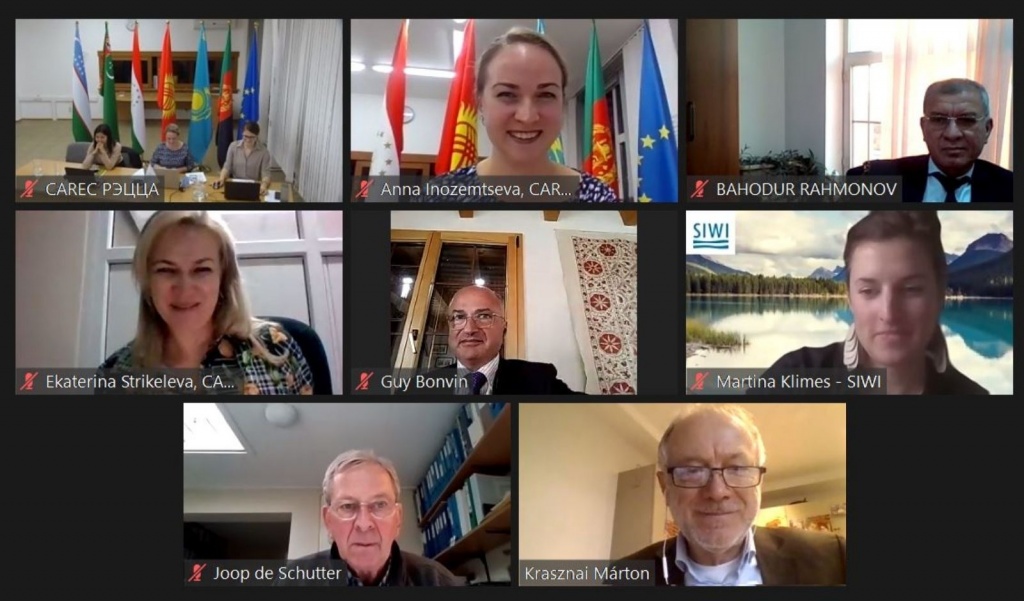On November 3, the research programme focusing on “Water as a driver of sustainable recovery: economic, institutional and strategic aspects of water resources management in Central Asia” was launched with its first webinar. The title of the event “Post-covid-19 recovery strategies: putting the water sector of Central Asia on an economically and financially sustainable path” explains its purpose very well. Central Asian and international experts have discussed current problems and opportunities of the water sector in the region.
The research programme is implemented by the Corvinus University of Budapest and supported by the Blue Peace Central Asia initiative (BPCA) of Swiss Agency for Development and Cooperation (SDC), the Stockholm International Water Institute (SIWI), and the Regional Environmental Centre for Central Asia (CAREC) within a partnership with the BPCA. The first event gathered international partners of the project and experts from national departments of Central Asian countries and Afghanistan. Moreover, the webinar was attended by EU Special Representative for Central Asia Peter Burian and representatives of the Scientific-Information Center of the Interstate Commission for Water Coordination of Central Asia, CAREC research institute and World Bank.
In his opening address, Ambassador Guy Bonvin, the Swiss Special Envoy for Water in Central Asia, underlined the key role of water for the sustainable socio-economic development and stability of the region and the importance of vibrant scientific and expert communities supporting this informed dialogue. Marton Krasznai, Scientific Director of the Center for Central Asia Research of Corvinus University, Budapest, outlined the aim of the programme, which will develop scientific and evidence-based recommendations with a socio-economic perspective for high-level decision-makers designing water sector-related policies. Those recommendations will come in the form of policy papers or by involving experts who advise decision-makers and will focus on solutions.
The programme is scheduled to last two years. Academicians and experts of the region shall generate scientific evidence to form policies papers. It will include a series of webinars and in presence workshops. The events during 2020 and the first quarter of 2021 will be held online, due to travel restrictions.

The first webinar was introductive, and it turned out to be very informative. The speakers covered main aspects of water management in Central Asia since 1991 when the countries of the region had gained independence. Experts from Afghanistan, Kazakhstan, Kyrgyzstan, Tajikistan and Uzbekistan presented overviews of the water sector development in their countries with the focus on financial challenges and other barriers to effective and sustainable water management.
Participants agreed that COVID-19 pandemic has affected not only the economy but the perception of the value of water resources, notably its importance for hygiene measures and its key role in the socio-economic stability. The crisis has exacerbated the existing flaws in economic and institutional systems of water management. The crisis is simultaneously an opportunity to build back better and to address these challenges with robust water-related policies based on scientific foundations. Those responses will have to include the climate change impact on the water cycle (e.g. glacier melting, flood, droughts), the reduction of international financing, the qualified staff shortage and the over-ageing of the existing infrastructure.
Meanwhile, countries made significant progress addressing those challenges: implementing water-saving technologies in the dryer regions, and Integrated Water Resource Management principles, as well as improving the relevant legislation. Aside from that, experts agreed on the importance of cooperation for the sustainable development of the region. International experts highlighted the importance of building trust by sharing information on water and maintaining a dialogue between different stakeholders and countries, as stated by Ambassador Guy Bonvin, the Swiss Special Envoy for Water in Central Asia. The other important factor for building a transboundary cooperative framework is strong coordination. A wide range of water users in agriculture, energy, industries and the environmental needs, and interests of every group are to be considered to achieve the fair and beneficial to all water cooperation. It is also essential to include gender mainstreaming into the water agenda.
Speaking further about coordination, there is a need to find common directions in the existing development programmes present in the region, focused on the shared benefits of the cooperation at the river basin level. Such coordination would strengthen the complementary of each programme and avoid duplications, according to experts.
The other opportunity to address the water challenges more efficiently is to enhance public-private partnership. Currently, the water sector in Central Asia is mostly funded by governments. And there is a lot of work to be done to attract private investments including changes in legislation and adaptation of tariffs.
But most importantly, as stated by Peter Burian, EU Special Representative for Central Asia, countries cannot wait until the pandemic ends, they need to address the challenges, which were revealed by COVID-19 without delay. Experts agreed that it is impossible to recover from the crisis without addressing water challenges and solutions are to sought beyond the water sector. Since the water is essential for life, for any economic activity, its sustainable and robust management is also a key to achieve most of the Sustainable Development Goals.